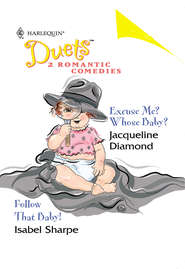По всем вопросам обращайтесь на: info@litportal.ru
(©) 2003-2024.
✖
The Would-Be Daddy
Автор
Год написания книги
2019
Настройки чтения
Размер шрифта
Высота строк
Поля
“It’s more a reflection on what medical schools teach doctors, or fail to teach them,” she said.
“I took courses in psychopathology and clinical psychiatry,” Marshall countered. “As well as serving a rotation in psychiatry.” Psychopathology was the study of the genetic, biological and other causes of mental disorders, along with their symptoms and treatments.
“Dealing with psychotics and how to medicate them?” Franca summarized.
“Basically, yes.”
“I figured.” Her nose wrinkled. “We won’t be dealing with psychotics. We’ll be helping ordinary people whose infertility creates problems for them.” Having finished her pita, she wiped her hands on her paper napkin.
Marshall reached across with his own napkin to dab the corner of her mouth. “Missed a spot.”
Startled, Franca lifted her chin, and her cheek brushed his hand. An electric tingle ran along his arm. “I could use an aide to follow me around and clean me up,” she said.
“Why bother, when I’m here?” he teased.
She smiled. “Promise you won’t do that in front of patients.”
“Promise you won’t eat a pita in front of patients.”
“It’s a deal.”
He returned to their topic. “I don’t mean to be dismissive, but why not refer troubled patients to Resolve?” The national organization assisted people coping with infertility.
“It’s a terrific group, but it’s a complement to therapy,” Franca said. “It doesn’t replace it. But I never answered your question.”
“About what happens in counseling?”
She nodded. “Infertility is a stressful experience. People often feel out of control and that they’ve failed. There’s loss and grief as well as financial concerns.” Fertility treatments could cost tens of thousands of dollars and were rarely covered by insurance. “Sharing your pain with others who are in the same boat can be a relief.”
“But why have a separate group for men?”
Franca took a sip from her mug. “Most infertility counseling focuses on the woman or on the couple’s relationship. But when the man is the source of the infertility, that can affect his feelings of masculinity and self-worth. And men in general have a harder time expressing their emotions.”
“That’s true of me,” Marshall conceded. Although he wasn’t entirely convinced, he’d run out of arguments. Moreover, an earlier comment of hers was rattling inside his head.
He’d assumed that by adopting, his parents had put to rest the issues associated with their infertility. Perhaps he’d been wrong. “Could those concerns persist after the couple adopts?”
“Certainly.” Sunlight through the window brought out the sprinkling of freckles across Franca’s cheeks. “A lot depends on the patients’ self-esteem and how they view adoption.”
“And therapy can help?” Too bad his parents hadn’t availed themselves of it. But that wouldn’t have suited their superior, stiff-upper-lip attitude.
“It isn’t a cure-all, but yes,” Franca said. “For example, adoptive parents worry whether there’ll be a temperamental mismatch and whether the child will bond with them as strongly as with a birth parent.”
“Or whether they’ll bond with the child?” Marshall asked.
“That, too.”
“You raise interesting points,” he said. “To me, therapy has always seemed unscientific, perhaps even...” He paused as a couple moved past them to claim an empty table.
“A weakness?”
“Yes.” He regarded her steadily. “I realize patients find it helpful. I’ve just never understood why.”
“I wish doctors underwent therapy the way psychologists do,” Franca said. “It’s part of our training.”
“Was it helpful to you?”
“Very.”
“In what way?”
“I learned to stop assuming I’m responsible for my mother’s happiness.” She tilted her head as she reflected. “Ten years ago, after my father died, my brother went his own way. My sister was already married and living out of state. So Mom focused her energies on me, insisting we talk for an hour every night. Sometimes she’d phone at lunch, too. It was intrusive, but I couldn’t bear to disappoint her. She’d always been more invested emotionally in her children than in my dad, despite their good relationship.”
“Why was that?” It had never occurred to him that children could be more important to a parent than the husband-wife bond.
“My mother had been married once before and had several miscarriages.” Franca hesitated, as if reluctant to confide too much. Odd, considering how readily she invited his confidences. Then she continued, “Her first husband couldn’t handle the disappointment and left. Mom never entirely recovered from that betrayal. So as you can see, I know about the fallout from fertility problems in my own family.”
“Surely things changed after she married your father, right?” He’d liked the elder Dr. Brightman when they’d met once at a campus event, although the man hadn’t spoken much. He’d puffed on an aromatic pipe and listened attentively to the conversation involving his wife, Franca and Belle.
“Yes,” Franca said. “Fortunately, there were no more miscarriages. But in a sense, I think she felt his loyalty had never truly been tested.”
An interesting insight—but not really relevant to today’s topic. “How did counseling help with your mom?”
“I had a frank talk with her about respecting boundaries,” Franca said. “I also suggested activities for her.”
“How’d she take it?”
“It upset her, and that upset me.” She sighed. “After a few rough weeks, she reluctantly joined a senior center. A couple of months later, she met a widower, and married him.”
“Is she happy?”
“Extremely.” Franca folded her hands on the table. “They moved to Reno, where his children live. She’s surrounded by grandkids, and except for the holidays, I’ve become barely more than a Facebook friend. A victim of my own success.”
That wasn’t the worst thing in the world. “If I were on Facebook, my mother would unfriend me,” Marshall muttered.
“Because of you and Nick being brothers? I don’t really understand how that happened.” Franca broke off as a server offered them each a chocolate chip cookie, courtesy of the café. “Thanks.” She set one on her napkin. Marshall accepted his and enjoyed the chocolate melting in his mouth while weighing how much to reveal.
He might as well spill it. The details would soon be all over the hospital anyway. “Nick’s parents allowed my parents to adopt me as a toddler. Upton Davis was much more successful financially, while my birth parents were nearly homeless. I gather they hadn’t planned on having two kids a year apart.”
Quentin Davis had stumbled from job to job, drinking heavily and refusing treatment for his bipolar disorder. Aunt Adina had held a series of low-paying positions, spending money whenever she had it and expecting it to fall out of the sky when she didn’t.
“How unusual that they chose to adopt the toddler rather than the baby,” Franca said.
“I presume Nick was still breastfeeding. Also, with a toddler, they had a better idea of how well the child was developing.”
“Aren’t you being a bit severe?” she asked.
“I know my parents.” Rather than elaborate, Marshall moved on. “My folks paid Adina and Quentin for an apartment and other living expenses, and insisted on secrecy in return. Until last week, I had no idea I was adopted.”











